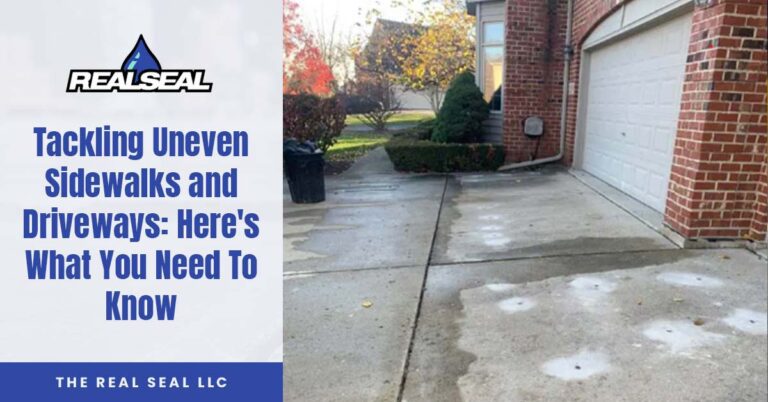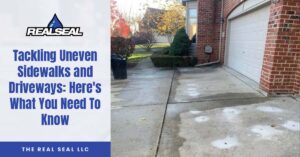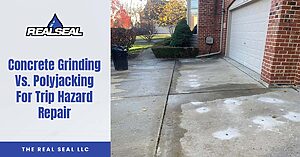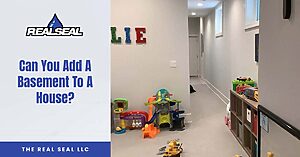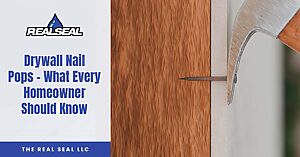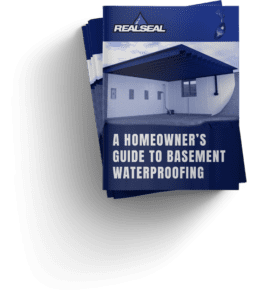Wondering if you can level concrete by yourself as a DIY project? If so, you’ve landed on the right page because that’s what we’re going to talk about in this article. You’ll learn the reasons concrete slabs such as sidewalks and driveways become uneven, how the professionals level an uneven slab, whether or not leveling concrete is a good DIY project, and more.
What Causes Concrete Sidewalks And Driveways To Become Uneven?
Concrete slabs such as sidewalks, driveways, patios, and pool decks become uneven for various reasons, including the following:
- Soil erosion under the slab – One of the primary causes of uneven concrete surfaces is soil erosion which can cause voids to form under the slab. If the slab settles into these voids, it can settle or tilt, resulting in an uneven surface.
- Poor installation – Inadequate soil preparation before the slab was poured can cause a sidewalk or driveway to eventually become uneven.
- Expansive soil – Soil that contains a lot of clay swells when it soaks up moisture and then shrinks when it releases moisture and dries out. This back-and-forth, swelling and shrinking, creates movement in the soil under the slab and will, over time, cause it to become uneven.
- Invasive tree roots – The presence of tree roots near a concrete surface can also contribute to unevenness. Roots can grow and spread, exerting pressure on the concrete slab and causing it to lift or buckle. We’ve all seen examples of this.
- Freeze-thaw cycle – In areas prone to freezing temperatures, the repeated freezing and thawing of water can cause the ground under the slab to move, resulting in an uneven surface.
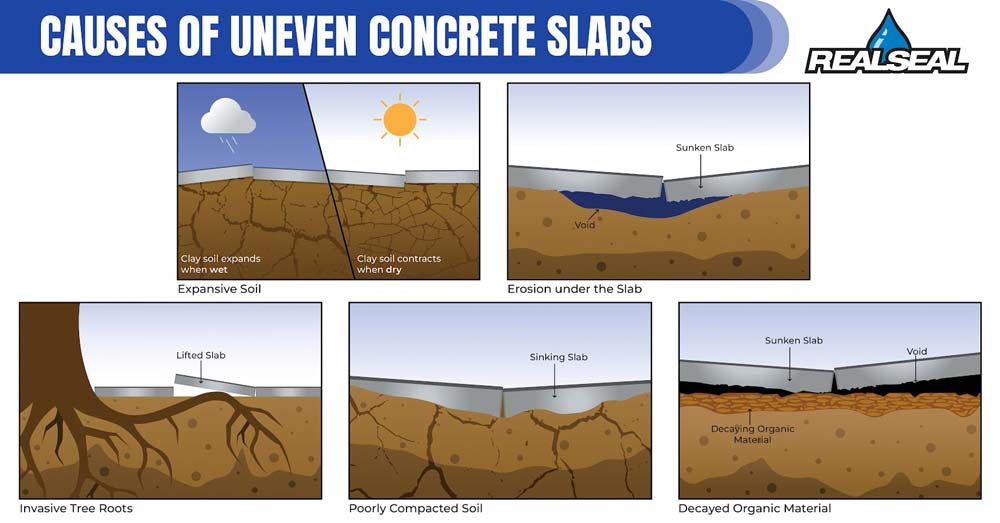
Why You Should Level Uneven Concrete Slabs
Uneven concrete surfaces are a trip hazard, eyesore, and diminish your property value. If left unaddressed, they’ll worsen over time and become more difficult and costly to fix. Therefore, it’s essential to identify the cause of the unevenness and take steps to address it immediately.
How The Pros Level An Uneven Slab
Contrary to what many people believe, an uneven concrete slab doesn’t necessarily need to be dug up and replaced. In fact, that’s only necessary if the slab is severely damaged. In most cases, an uneven slab can be leveled by injecting something under the slab to lift it up.
Mudjacking, the old-school way to level an uneven concrete slab
The old-school way to level an uneven slab is a procedure called mudjacking. It involves drilling holes in the affected slab and injecting a cement slurry (cement, soil, sand) under it in order to raise it. While mudjacking is still being used today, it’s not nearly as popular as it once was.
Today, most concrete leveling is done using polyurethane foam injection (Polyjacking)
Today, a procedure called polyurethane foam injection, or Polyjacking, is the minimally-invasive method most professionals use to level uneven concrete slabs. It involves drilling smaller, dime-sized holes into the affected slab, and then injecting the foam under the slab via the holes. As the foam expands, it raises the slab.
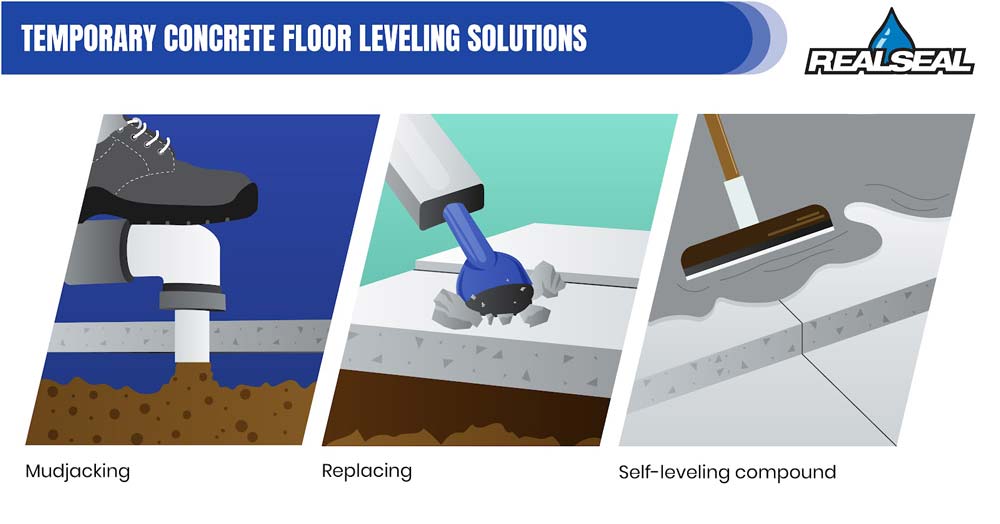
Polyurethane foam injection is preferred over mudjacking because it can usually be completed in a few hours and because it’s waterproof, it’s resistant to post-repair washouts. As a result, the technique has become popular for lifting and leveling concrete slabs such as sidewalks, driveways, patios, pool decks, etc.
For more information, see How Long Does Foam Jacking Last?
Can You Level Concrete By Yourself As A DIY Project?
While DIY concrete leveling may seem like a simple job, it’s riddled with challenges that only a seasoned expert can successfully navigate. For instance, determining the right quantity and consistency of the leveling compound requires knowledge and experience. Professionals also use special equipment (that isn’t for rent) to assess both the slab and the soil underneath it. Therefore, we recommend investing in professional concrete leveling services that come with a warranty instead of trying to do this yourself.
Leveling Concrete Vs. Replacing The Slab
Unless the slab is severely damaged, it can almost always be leveled using polyurethane foam injection. Replacing the slab means tearing up the old concrete and replacing it with new, fresh concrete. While replacing a slab is more expensive and time-consuming than leveling, it may be necessary if there’s extensive damage.
How To Prevent Uneven Concrete Slabs
Fortunately, there are things you can do that will help prevent concrete slabs from becoming uneven. These include the following:
- Proper preparation of the subgrade – One of the most important steps in preventing uneven concrete slabs is to properly prepare the subgrade before pouring the slab. All organic matter – leaves, etc. – should be removed, and the soil should be compacted as much as possible. This will create a stable base for the concrete to be poured on, reducing the likelihood of settlement leading to unevenness.
- Include reinforcement – Materials like rebar and wire mesh can be added to help stabilize the slab and prevent it from eventually becoming uneven.
- Ensure the concrete is properly mixed – The concrete mixture should be properly mixed and poured to ensure that it flows evenly across the entire surface. Vibrating tools can be used to help settle the concrete, reducing the risk of air pockets that can cause unevenness.
- Good drainage under the slab – Poor drainage can lead to the formation of voids. If the slab settles into the voids, it can become uneven.
- Proper maintenance – Cracks should be repaired as soon as possible, and any signs of settling or shifting should be addressed immediately.
If you have an unlevel concrete slab on your Chicagoland property, contact The Real Seal today. We’ll come out, evaluate the problem, and give you a repair estimate. Our concrete leveling services come with a 5 year warranty, although the polyurethane foam will last indefinitely.
